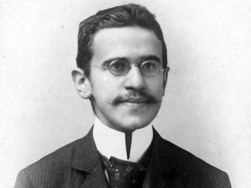 I am pleased to announce that my publication on Otto’s Weininger’s book Sex and Character is now available in the Literatura, kultura, media journal. In the paper “Otto Weininger: mizogin i profeminista?” [Otto Weininger: misogynist and profeminist?] I present my unique analyses of Weininger’s only book, which influenced not only (antifeminist and misogynist) male scholars and artists from his époque such as James Joyce, August Strindberg and Ludwig Wittgenstain but also several feminist thinkers e.g. Charlotte Perkins Gilman and Germaine Greer.
I am pleased to announce that my publication on Otto’s Weininger’s book Sex and Character is now available in the Literatura, kultura, media journal. In the paper “Otto Weininger: mizogin i profeminista?” [Otto Weininger: misogynist and profeminist?] I present my unique analyses of Weininger’s only book, which influenced not only (antifeminist and misogynist) male scholars and artists from his époque such as James Joyce, August Strindberg and Ludwig Wittgenstain but also several feminist thinkers e.g. Charlotte Perkins Gilman and Germaine Greer.
In the feminist scholarship Sex and Character is usually considered to be one of the most well- known antifeminist manifestos (Beller 1995). His analyses of female and male “characters” is highly mysogynist and according to Sengoopta Chandak his work “was a serious, comprehensive, and emotionally charged ideological critique of modernity in general and of women’s emancipation in particular.” (2000:1). Having that said, Weininger’s analyses and his ideas regarding the position of women in society, might also be interpreted as rather progressive and can be comparable with (pro)feminist movements’ claims. As much as he despised women or rather the type of femininity that was prominent in XIX century Vienna (and Europe) discourse and practice, he claimed that women should be treated equally to men including for example, having the right to the same type of education that is available to men. According to Kolleth “Weininger argues, while it is too dangerous to give women the vote (a position held by many political liberals of the time) or to allow them an active role in politics, they must in all other respects, especially in the law, be treated as equals, as proper human beings, for only then will there ever be a chance of the miracle happening: the real emancipation of women from WOMEN (…) for women to be free is to develop the MEN in them, to became rational, moral beings, and to shake off their lesser selves. In proposing such a legal equality for women, it should be noted, Weininger was being fairly progressive for his time.” (1986: 98)* Therefore, the main aim of my paper is to investigate to what extent Weininger’s work expresses his misogynous approach but also, to what extent his ideas can be defined as pro-feminist. Enjoy (if you can read Polish ;)).
*Kolleth, Sabina. „Gewalt in Ehe und Intimpartnerschaft”. W: Gluecklich ist, wer vergisst…? Dasandere Wien um 1900, red. Hubert Ehalt, Gernot Heiss, Hannes Stekl, 145–171. Vienna: Böhlau,
1986.